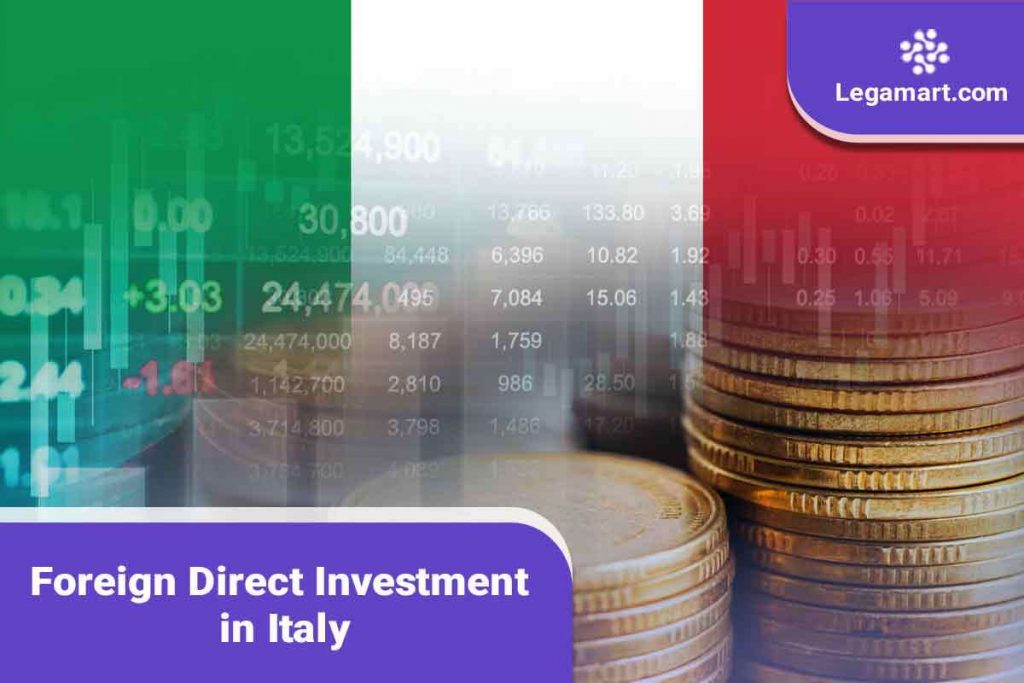Introduction
Foreign investments are key accelerators of a country’s economy. Not only does foreign investment serve as a source of revenue, but it also provides employment. It also allows the transfer of business experts and technologies to other countries.
Italy, with its robust economy, strategic location, and skilled workforce, draws foreign investment. A 3 percent increase in output is predicted for the Italian economy in 2022 after recovering from the COVID-19-related drop.
On March 22, 2022, Law Decree No 21/2022 entered into force. This introduced some changes to the Golden Power Rules governing foreign direct investment in Italy. This article discusses foreign investment in Italy, the changes to the Golden Power rules, and the business environment in Italy.
Italy’s Business Climate in 2022

The Italian economy is the eighth largest in the world, and it is controlled by small and medium-sized enterprises. The bulk of these small and medium-sized businesses are in manufacturing. The Italian economy has bounced back after the COVID-19 impact and has expanded by 6.6 percent in 2021. It has also experienced a 17 percent increase in investment. Italy is one of the largest markets in the European Union. Its strategic proximity to North Africa and the Middle East makes Italy an attraction for foreign investment. About 18 percent of the Italian GDP consists of foreign companies and 14 percent investments.
Yet, the economy is facing new challenges. High energy prices and supply chain interruption caused by the Russian-Ukrainian war are some economic setbacks. This has caused uncertainty around consumer and business confidence in Italy. Still, the Italian economy is predicted to grow by 3 percent in 2022. Though investment increased rapidly in the first quarter of 2022, the subsisting challenges may dent business investments.
Foreign Direct Investment (FDI) in Italy

FDI is the investment by an investor in a country’s economy other than that of the investor. FDI aims to establish a lasting relationship with the foreign target company. Under the FDI, foreign investors have a stake and control of the assets of a company. FDI involves the acquisition of 10% or more of the ordinary shares or voting power of a foreign company.
Foreign Portfolio Investment (FPI) entails the acquisition of the securities or financial assets of a foreign company. The term describes when an investor holds securities of a foreign enterprise. It is one of the most common ways to invest in an overseas economy. Bonds, equities, stocks, and mutual funds are examples of financial assets under FPI.
FDI makes for lasting interest in foreign business. Foreign investors in FDI can manage and control the business. In most cases, FDI is a short-term attempt by investors to make money. It does not give investors ownership of the financial asset. Foreign Portfolio investment is always fluid because it is subject to the whims and caprice of the market investment is made.
FDI in Italy, took a major turn after Law Decree No. 21/2022 entered into force and amended Law Decree No. 21/2012. The Decree, also known as the Golden Power Rules, provides the legal framework for foreign direct investments in Italy. By this rule, the Italian government has the “Golden Power” to veto foreign transactions in strategic sectors. This is more so if such a transaction threatens national security.
The Golden Power was first enacted in 2012 by Law Decree No 21/2012. There have been many follow-up legislations, with The Law Decree No 21/2022 being the most recent. Law Decree No 21/2022, which was enacted on March 21, 2022, enacted amended Law Decree No 21/2012. The Decree empowers the Italian government to review transactions in strategic sectors. The government of Italy can also veto a transaction that poses a threat to national security.
Changes Introduced by Law Decree No 21/2022
The 2022 Decree has brought changes to the foreign investment regime. Among these changes is the expansion of the strategic sector, which includes defence/national security, energy, transportation, telecommunications (5G and cloud computing), critical infrastructure, sensitive technology, and nuclear technology.

Law Decree No 21/2022 further confirmed the Liquidity Decree enacted in 2020. Thfe Liquidity Decree will be in force until December 31 2022. As such, the government of Italy will review any acquisition by non-EU entities in any strategic sector that exceeds certain thresholds.
Controlling stakes of a non-European Economic Area (EEA) investor in any strategic sector that is above 10% of the share in capital for investment value that is or more than EUR 1 million is subject to the review of the Italian government. The same applies to investments above the 15%, 20%, 25%, and 50% thresholds. The Italian government also has the power to review a foreign transaction in Italy by EU entities in sectors outside of defence and national security (communication, energy, transportation, health, agri-food, and financial sectors).
Another change introduced by Law Decree No 21/2022 is expanding the prior government notification procedure to all business activities that affect defence and national security. Thus, Foreign Direct Investment in Italy that affects the ownership, control, and availability of strategic assets in the defense and national security sector must notify the Government of Italy.
Investitalia is the agency created by the Italian government to coordinate and promote foreign direct investment in Italy. The national agency operates under the Italian Ministry of Economy and Finance.
If you have further questions on FDI in Italy, do drop your questions on our LegaMart community page, and be sure to get answers immediately.
Foreign Portfolio Investment in Italy
According to CEIC data, Foreign Portfolio Investment in Italy was at -1.5% of GDP in March 2022. The record shows an increase from the previous -5.1% report for December 2021.
The Italian government is open to Foreign Portfolio Investment in Italy. Also, foreign investors are primary shareholders in many Italian publicly traded companies. Italy’s financial markets are controlled by CONSOB (Italian Companies and Stock Exchange Commission), The Bank of Italy, and IVASS (The Institute for the supervision of Insurance).
Though foreign participation in the Italian capital market is not restricted, Italy has an underdeveloped capital market. Businesses prefer credit financing and are majorly dependent on bank financing. Access to equity capital in Italy by a foreign investor is difficult, and Italy financial experts have attributed the low equity financing to slow CONSOB processes and cultural biases against private equity. The Italian government has initiated some programs to encourage other forms of financing.
In contrast to the size of the economy of Italy, The Italian Association of Private Equity, Venture Capital and Private Debt (AIFI) estimates that investment by venture capital and private equity funds in Italy totals around EUR 4.5 billion.
The government of Italy allows financial services companies incorporated in any of the EU member states to offer investment services in Italy without being locally present in Italy.
Italy FDI Outflow
FDI flows represent the value of cross-border transactions related to direct investment at a given time. FDI outflow represents the value of outward direct investment made by residents of a reporting economy to a foreign enterprise. According to The Statista Research Department, the value of foreign direct investment outward flows in Italy declined from 53.7 billion U.S. dollars in 2011 to approximately 24.9 billion U.S. dollars in 2019.
Conclusion
The Italian economy has bounced back from the drop in output caused by the COVID-19 pandemic. Given its robust economy and one of the largest markets in the European Union, Italy remains a center for foreign investment. Yet, protracted administrative procedures, corruption, and high labor cost have restrained investment in Italy. Likewise, the Russian- Ukrainian war has caused inflation in energy prices, and disruption in the supply chain has cast uncertainty on the business environment of Italy. Nonetheless, the Italian economy is predicted to grow by 3 percent in 2022.
Law Decree No 21/2022 entered into force on March 22 2022, and it amended Law Decree No 21/2012. The foreign investment regime in Italy expanded the power of the Italian government to review any transaction that affects specific strategic sectors. One such sector is the 5G and cloud services sectors. As such, the Italian government can also block or veto transactions that are a threat to national security.
The government of Italy welcomes and encourages foreign investments in Italy. In addition, there are many reasons why you should invest in Italy. Are you looking to acquire a stake or assets in a business enterprise in Italy? Do you need a legal expert to guide you through the procedure of FDI and FPI in Italy? LegaMart has got your back! LegaMart is an online legal platform that provides a wide range of legal services. With its directory of lawyers from across the globe, LegaMart provides direct interaction between lawyers and clients. Visit the LegaMart lawyer directory to hire a lawyer that meets your requirements.




